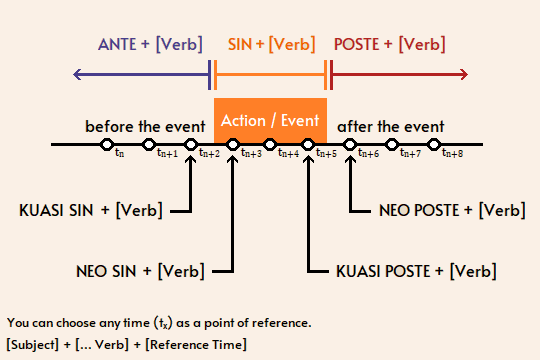Tense & Aspect
Glotoid verbs do not differentiate absolute tense. Their forms stay the same whether the action happens in the past, present, or future. We can infer tense by specifying the actual time.
| M'ai 1SG-∈ |
dromos. run |
| 'I ran / (will) run.' | |
| M'ai 1SG-∈ |
dromose run-ᴄᴏɴs |
hestera. yesterday |
| 'I ran yesterday.' | ||
| M'ai 1SG-∈ |
dromose run-ᴄᴏɴs |
krasta. tomorrow |
| 'I will run tomorrow.' | ||
Chronology
We can also talk about a sequence of events using ante, sin, and poste.
| ante | : | before |
| sin | : | during, when, while |
| poste | : | after |

| Me'ai 1SG-∈ |
fagos' eat |
ante before |
biblio book-ɢᴇɴ |
leksos' read |
| 'I eat (breakfast) before reading a book.' | ||||
| Me'ai 1SG-∈ |
himo clothes-ɢᴇɴ |
katarogenos' clean-ᴄᴀᴜ |
poste after |
biblio book-ɢᴇɴ |
leksos' read |
| 'I do laundry after reading a book.' | |||||
| Me'ai 1SG-∈ |
himo clothes-ɢᴇɴ |
katarogenos' clean-ᴄᴀᴜ |
sin during |
musiko music-ɢᴇɴ |
akustos' listen |
| 'I do laundry while listening to some music.' | |||||
We can also use ante, sin, and poste to mark prospective (thing yet to come), progressive (things currently on-going), and perfect aspects (things already finished).
| Me'ai 1SG-∈ |
ante before |
biblio book-ɢᴇɴ |
leksos' read |
sin he 7.30. at 7.30 |
| 'I hadn't read a book yet at 7.30.' | ||||
| Me'ai 1SG-∈ |
sin during |
biblio book-ɢᴇɴ |
leksos' read |
sin he 8.30. at 8.30 |
| 'I was reading a book at 8.30.' | ||||
| Me'ai 1SG-∈ |
poste after |
biblio book-ɢᴇɴ |
leksos' read |
sin he 9.30. at 9.30 |
| 'I have finished reading a book at 9.30.' | ||||
We can further specify proximity with kuasi (almost), inception with eise (become, into), and recentness with neo (new), but these are rarely used.
| kuasi | : | just about to start |
| eise | : | starts to |
| neo | : | just started |
| poste eise / posteise | : | has started |
| kuasi poste | : | just about to finish |
| eise poste | : | finishes |
| neo poste | : | just finished |

Conditionals and Hypothetical Scenarios
Conditional statements in the form of "if A, then B" can be expressed with amfo sin he 'whenever, anytime when' or sekua sin he 'next time when'.
| M'ai 1SG-∈ |
magiros' cook |
sekua sin he next time when |
t'ai 2sg-∈ |
fago- eat |
telosa. want |
| 'I will cook if you want to eat (next time, I promise).' | |||||
| M'ai 1SG-∈ |
non NEG |
nautos' drive |
amfo sin he whenever |
m'ai 1sg-∈ |
ebriosa. intoxicated |
| 'I don't drive if I'm drunk (ever)' | |||||
Hypothetical unreal statements in the form of "if A had happened, then B would've happened (but A didn't actually happen)" can be expressed with kuasi 'almost' and kuasi eise 'almost become' at the verb of the hypothetical condition and hypothetical outcome.
| M'ai 1SG-∈ |
kuasi eise almost become |
fagos' eat |
sin he when |
bromat'ai food-∈ |
kuasi almost |
ontosa. exist |
| 'I would've eaten if there was food (but there was no food).' | ||||||